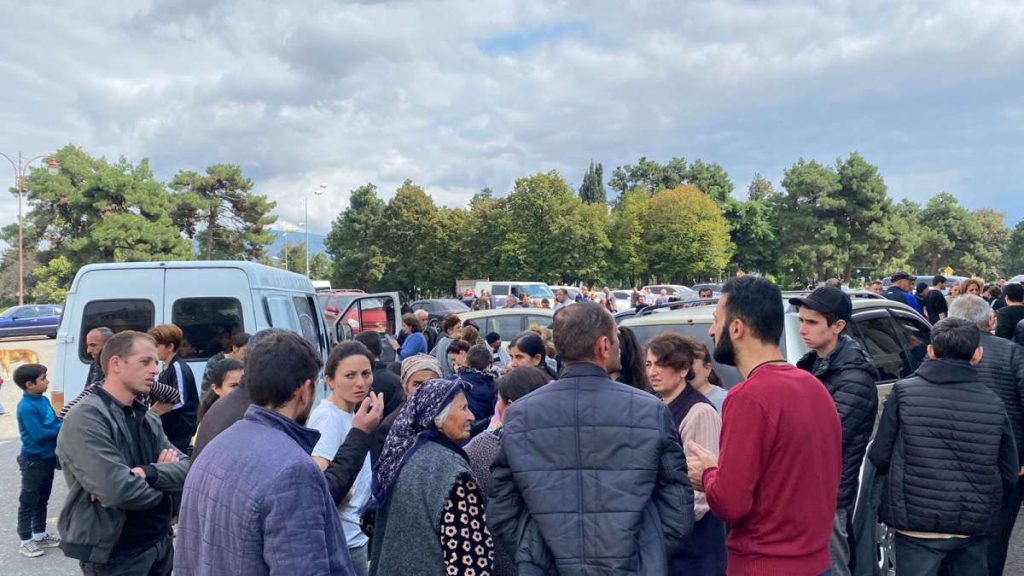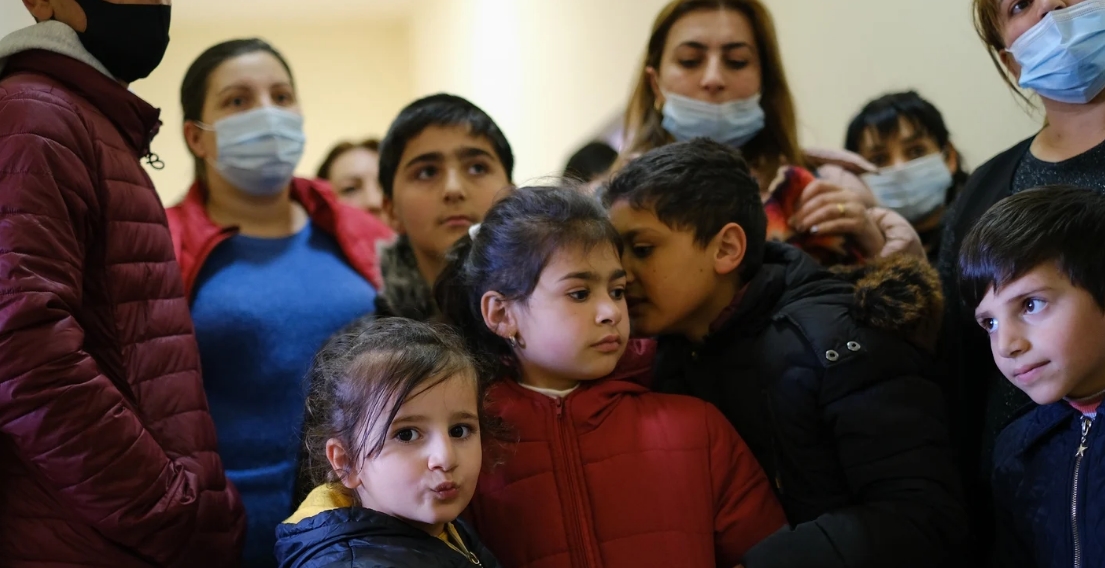Late last month’s blitz against the Armenian Christians is the latest chapter in a bitter, decades-long conflict between Armenia and Azerbaijan….reports Asian Lite News
The latest blitz by Azerbaijan in Nagorno-Karabakh and the subsequent refugee exodus to Armenia should be termed and condemned, as ethnic cleansing of the disputed conclave and so-called Islamic countries should take the lead for this initiative.
Late last month’s blitz against the Armenian Christians is the latest chapter in a bitter, decades-long conflict between Armenia and Azerbaijan.
War between the two neighbours started during the collapse of the Soviet Union, of which both countries had been a part.
Armenia won control over Nagorno-Karabakh and a wide surrounding region by end-1994. This also resulted in displacement of more than a million people, including hundreds of thousands of Azerbaijanis living in the disputed area.
In 2020, after a 44-day war Azerbaijan retook much of that territory, but the heart of Nagorno-Karabakh remains a de facto independent conclave. Moscow brokered a deal between the warring nations and Russian soldiers were deployed along the borders to protect the status quo.
At present, the Lachin corridor is the only available route for most of the refugees fleeing Karabakh, Armenia’s decision not to defend them and instead recognise the territorial integrity of Azerbaijan –accepting Karabakh’s integration — was a bitter pill for most of the fleeing.
In fact, the conclave of Nagorno-Karabakh is recognised internationally as part of Azerbaijan but large areas of it have been controlled by ethnic Armenians for three decades, and it remains at the heart of one of the world’s longest-running conflicts.
Azerbaijan officials have said there would be no retribution against Karabakh residents who served in the military, except for those who had committed war crimes in previous conflicts.

Further, Baku has promised to offer equal rights to all those who stay.
Azerbaijan’s President Ilham Aliyev said last week that the Armenian population in Karabakh could now breathe easy, they are our citizens.
Echoing international concern, the US last week urged Azerbaijan to preserve civilian rights and allow humanitarian and monitoring missions, as hundreds of Armenians left their homes in Nagorno-Karabakh, citing fears of ethnic cleansing.
Reportedly on the first day of the exodus, at least 13,550 of the 120,000 ethnic Armenians who called Nagorno-Karabakh home arrived in Armenia.
US Agency for International Development (USAID) chief Samantha Power urged Azerbaijan to maintain the ceasefire and take concrete steps to protect the rights of civilians in Nagorno-Karabakh.
Power, who earlier gave Armenian Prime Minister Nikol Pashinyan a letter of solidarity from President Joe Biden, said Azerbaijan’s use of force was wrong and that the US was considering a reaction.
She urged Azerbaijan’s President Ilham Aliyev to keep his pledge to defend ethnic Armenian rights by reopening the Lachin corridor, which connects the area to Armenia, and allowing relief supplies and an international monitoring team to enter the country.
However, so far there has been no international condemnation of the Azerbaijani action, as Armenia complains of the Russian neglect to honour its pledge to safeguard Armenians due to involvement and focus of its forces on the Ukrainian conflict.
Historically, in the 1920s modern-day Armenia and Azerbaijan became part of the Soviet Union. The area designated Nagorno-Karabakh had a majority ethnic-Armenian population but was controlled by Azerbaijan. When the Soviet Union began to collapse in the late 1980s, Nagorno-Karabakh’s regional parliament voted to become part of Armenia. As a result Azerbaijan sought to suppress the separatist movement, while Armenia backed it.
This move led to ethnic clashes and a full-scale war after both the countries declared independence from Russia. The biggest military confrontation since the early 1990s started in 2020 resulting in six weeks of heavy fighting.
Azerbaijan won back territory and by the time both sides agreed to sign a Russian-brokered peace deal in November 2020, it had recaptured all the territories surrounding Nagorno-Karabakh held by Armenia since 1994.
Under the agreement, Armenian forces had to withdraw from these areas and have since been confined to a smaller part of the region.
In fact, the latest move by Azerbaijan changes the balance of power in the South Caucasus region, a mixture of ethnicities. The region is also crisscrossed with oil and gas pipelines where Russia, the US, Turkey and Iran are jostling for influence.
Since the breakup of the Soviet Union, Armenia had relied on a security partnership with Russia, while Azerbaijan grew close to Turkey, with which it shares linguistic and cultural ties.
Armenia has sought closer ties with the West, in view of Moscow’s neglect, which Moscow denies and has told President Pashinyan that he is making a big mistake by flirting with the United States. Aliyev hinted recently at the prospect of creating a land corridor to Turkey across Armenia.
Regional powers have been heavily involved in the conflict over the years. Turkey has close cultural and historical links to Azerbaijan. Turkish-made Bayraktar drones are said to have played a crucial role in the fighting in 2020, allowing Azerbaijan to make territorial gains.
According to latest UN Refugee Agency (UNHCR) reports, over 88,000 refugees from the Karabakh region have fled to Armenia in less than a week and humanitarian needs are surging.
Last week, UNHCR chief Filippo Grandi tweeted that more than 100,000 refugees had now arrived in Armenia from Karabakh.
In fact, this was a tragedy that could have been avoided.
The New York Times recently wrote about what’s now happening in Nagorno-Karabakh and why “almost no one saw it coming”.
Nothing could be more wrong. Armenians, as well as those who have followed the conflict, have warned for a long time that this was coming.
Svante Lundgren, Researcher at Lund University, Sweden in his analysis for conversation.com stated that as a result of the Azerbaijani attack on the Armenians of Nagorno-Karabakh on September 19 and the forced exodus that followed it, this region would soon be empty of Armenians — for the first time in more than two millennia.
And this has happened due to no global condemnation or action against Azeri military actions, which can’t be stopped just by words but by action on the ground.

Leave a Reply